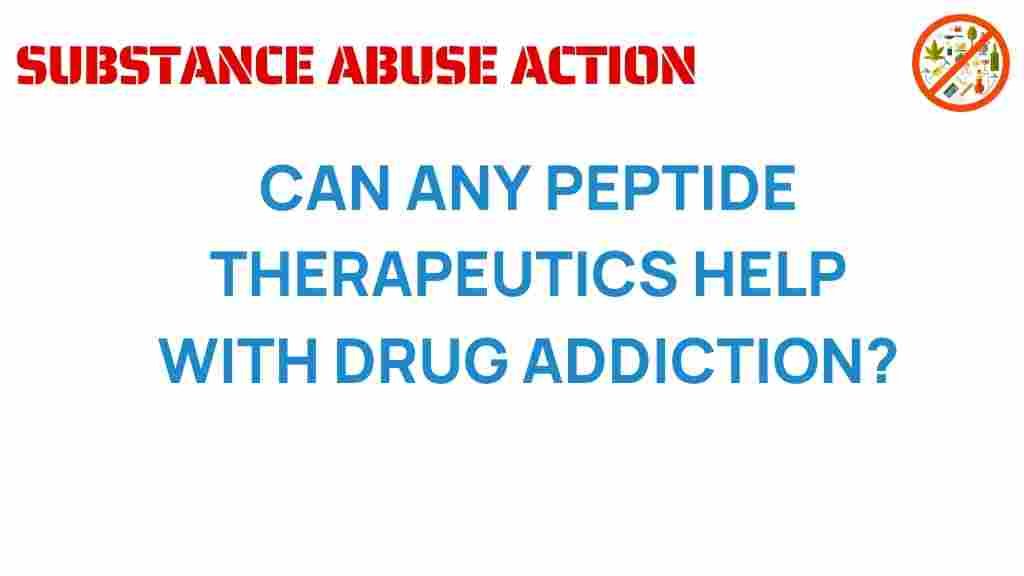Can Peptide Therapeutics Revolutionize Drug Addiction Treatment?
Drug addiction is a pervasive issue affecting millions worldwide, leading to significant mental health challenges and societal costs. Traditional treatment methods have proven effective for some, but many individuals struggle to achieve lasting recovery. As the field of neuroscience advances, new and innovative solutions are emerging, one of which is peptide therapeutics. This article explores how peptide therapeutics could revolutionize drug addiction treatment, offering hope for better recovery outcomes in the realm of mental health and addiction therapies.
Understanding Peptide Therapeutics
Peptide therapeutics are small chains of amino acids that can influence biological processes in the body. They have gained traction in healthcare due to their ability to target specific pathways and receptors, leading to effective treatments for various conditions, including metabolic disorders, cancers, and now, potentially, drug addiction.
The Neuroscience Behind Drug Addiction
To appreciate the potential of peptide therapeutics in treating drug addiction, it’s essential to understand the neuroscience behind addiction. Drug addiction alters brain chemistry and neural pathways, creating a cycle of craving and use that can be difficult to break. Key areas affected include:
- The Reward System: Drugs can hijack the brain’s reward system, leading to increased dopamine levels and reinforcing the behavior of substance use.
- Stress Response: Chronic drug use can change how the brain responds to stress, making it harder for individuals to cope without substances.
- Impulse Control: Addiction impacts areas of the brain responsible for decision-making and impulse control, making it challenging for individuals to resist urges.
The Role of Peptide Therapeutics in Addiction Treatment
Peptide therapeutics offer a promising new avenue for treating drug addiction by targeting the underlying biological mechanisms affected by substance abuse. Here are several ways they could transform addiction therapies:
- Modulating Neurotransmitter Activity: Certain peptides can influence neurotransmitter systems, potentially restoring balance to the brain’s chemistry disrupted by addiction.
- Reducing Cravings: Peptides that affect the reward pathways may help reduce cravings, making it easier for individuals to abstain from substances.
- Enhancing Recovery Outcomes: By targeting the brain’s stress response, peptide therapeutics may help individuals better manage stress and avoid relapse during recovery.
Current Research and Developments
Several studies are investigating the efficacy of peptide therapeutics in addiction treatment. For example, research into neuropeptides like oxytocin and endorphins shows potential for reducing drug-seeking behavior and enhancing emotional well-being. Here are some notable findings:
- Oxytocin: Known as the “love hormone,” studies suggest that oxytocin may reduce cravings and enhance social bonding, which can be beneficial in recovery.
- Endorphins: These natural painkillers can be targeted by peptides to help reduce withdrawal symptoms and cravings.
- Neuropeptide Y (NPY): Research indicates that NPY may play a role in reducing anxiety and stress-related behaviors, which are often triggers for relapse.
A Step-by-Step Process for Implementing Peptide Therapeutics in Treatment
Integrating peptide therapeutics into drug addiction treatment requires careful planning and collaboration among healthcare professionals. Here’s a step-by-step process:
Step 1: Assessment
Identify individuals struggling with drug addiction and assess their specific needs, including mental health status and previous treatment efforts.
Step 2: Research and Development
Stay updated on ongoing research regarding peptide therapeutics and their applications in addiction treatment.
Step 3: Clinical Trials
Encourage participation in clinical trials to gather data on the effectiveness of peptide therapies in treating drug addiction.
Step 4: Personalized Treatment Plans
Develop personalized treatment plans that may include peptide therapeutics alongside traditional therapies such as counseling and behavioral therapies.
Step 5: Monitoring and Adjustment
Regularly monitor patients’ progress and adjust treatment plans as necessary to optimize recovery outcomes.
Troubleshooting Tips for Healthcare Providers
Implementing peptide therapeutics in drug addiction treatment may present challenges. Here are some troubleshooting tips:
- Stay Informed: Keep abreast of the latest research to understand the best practices for using peptide therapeutics in addiction treatment.
- Patient Education: Educate patients about the potential benefits and risks of peptide treatments to ensure informed consent and adherence.
- Collaborate: Work closely with researchers and other healthcare providers to share insights and improve treatment strategies.
- Monitor Side Effects: Be vigilant for any adverse reactions in patients receiving peptide therapeutics and be prepared to make necessary adjustments.
Conclusion: A New Horizon for Drug Addiction Treatment
Peptide therapeutics hold great promise in revolutionizing drug addiction treatment. By targeting the biological underpinnings of addiction, these innovative solutions could enhance recovery outcomes and improve mental health for those struggling with substance use disorders. As research continues to unfold, the integration of peptide therapies into addiction treatment could provide a much-needed lifeline for individuals seeking recovery.
For more information on innovative treatment approaches for drug addiction, visit this resource. If you’re interested in the latest research on peptide therapeutics, check out this study.
This article is in the category Treatment and created by SubstanceAbuseAction Team
